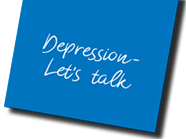What causes depression?
A negative event such as the loss of a loved one, losing a job, or suffering from a severe somatic illness – or severe and prolonged stress, can sometimes trigger a depressive episode but sometimes depression will occur spontaneously without any obvious cause.
Other interacting factors contribute to the onset and maintenance of depression, including genetic factors, changes in hormone levels, certain medical conditions, stress, grief or difficult life circumstances. Any of these factors in combination can lead to changes in brain physiology and difficulty adapting to external and internal events, leading to depression’s signs and symptoms.
Isolated factors are unlikely to cause depression. We can easily imagine a 'downward spiral' of events leading to depression: imagine your marriage breaks down, you will be likely feeling low, so you will avoid seeing friends and family, and you may start abusing alcohol. This sequence of related events can make you feel worse and can complicate the descent into depression.
Let’s take another example. From what is known in scientific research as of today, depression has a genetic component but until now it was not possible to identify a specific single gene that causes the onset of a depressive episode. Many studies (including population studies and twin and adoption research) have shown that the likelihood of developing depression triples for people with depressed parents or siblings in comparison to people not having a depression-affected relative in their family. In other words: relatives of families in which depression occurs are often prone to the disorder. But for the actual development of the disorder, further factors have to be present as well.
Therefore, depression is biopsychosocial and its development varies from person to person.
This means that, in order to explain the development of depression, we have to consider the interaction between both biological and psychological factors. Both aspects are like two sides of a coin and this interaction of psychosocial and neurobiological factors is not only important in the development of depression, but in all other mental disorders as well. These factors can interact at the level of predisposition or resilience, triggering, and maintenance or resolution.



